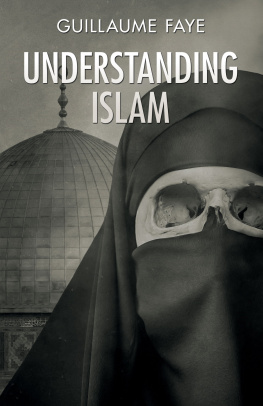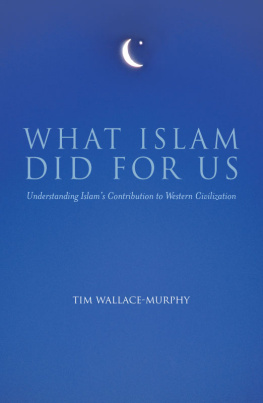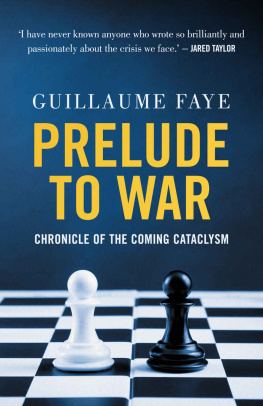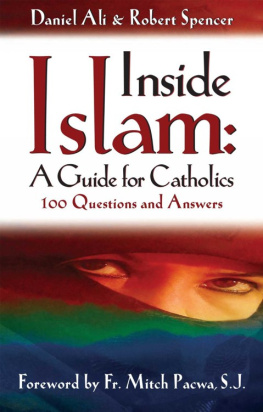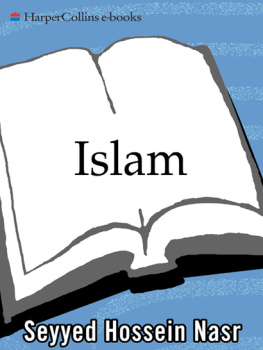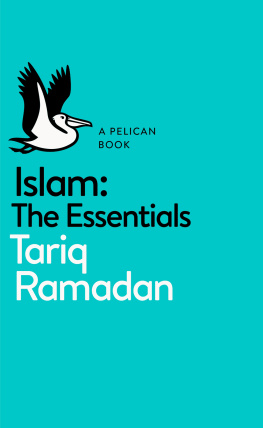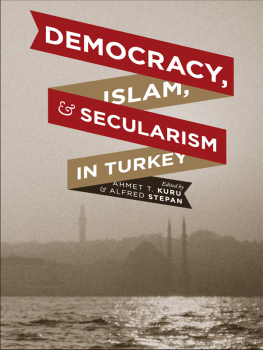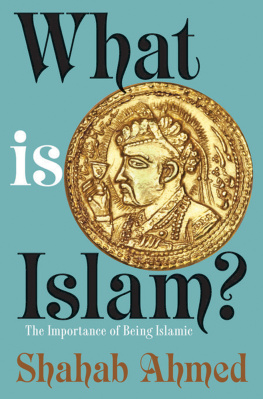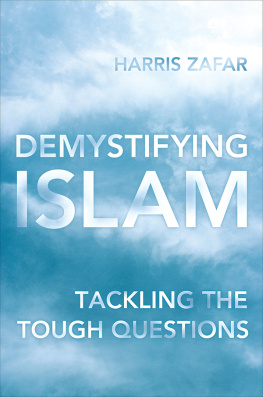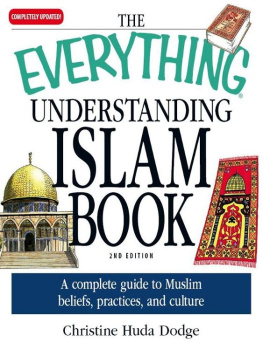Guillaume Faye
Understanding Islam
London
Arktos
2017
Copyright 2017 by Arktos Media Ltd.
Follow us: Website | Facebook | Twitter | Instagram
All rights reserved. No part of this book may be reproduced or utilised in any form or by any means (whether electronic or mechanical), including photocopying, recording or by any information storage and retrieval system, without permission in writing from the publisher.
ISBN
978-1-910524-83-1 (Softcover)
978-1-912079-00-1 (Hardback)
978-1-912079-72-8 (Ebook)
Translation
Roger Adwan
Editing
Martin Locker
Proofreader
Daniel Friberg
Cover design
Andreas Nilsson
Layout
Tor Westman
ARKTOS MEDIA LTD.
Introduction: A Radical, Archaic Novelty
Understanding Islam means identifying its double rationale, its twofold, age-old DNA: totalitarianism and jihad , paired with a belligerent conquest devoid of geographical restrictions, always accomplished through cunning or violence. To understand Islam is to become aware of the fact that, despite its deadly internecine divisions, it targets a common enemy: our own civilisation, as well as all other ones. Understanding Islam means grasping that the sole difference between Islam and Islamism lies in their respective tactics. To understand Islam is to ponder its propensity to confuse faith with lawfulness, temporality with spirituality and religion with politics. Understanding Islam means conceding that, due to its very essence, it is absolutely incompatible with pluralist democracy, secularism and freedom. Its cause is one of theocracy and its reign synonymous with the decline of intelligence and the waning of free inquiry.
To understand Islam is to look upon secular Islam or Islamic enlightenment as mere utopias. Its Western collaborators are in a state of submission, remaining frightened and blinded while simultaneously contradicting their own principles in a fit of schizophrenia. Understanding Islam means exposing its blurred convergences with Fascism, Nazism, Marxist Communism and anti-Semitism. To understand Islam is to assess how much it relies on a settlement process through immigration and on swift and uncontrolled mass colonisation.
To understand Islam is to perceive that it has no metaphysical aspect to speak of, lacks any theological dimension and is bereft of any and all philosophy. Instead, it depends on the dogmatic binomial of superstition and ideology. In addition, our understanding of Islam leads us to ponder the duality between obscurantism and reason, as well as that between submission and freedom.
To understand Islam is to acknowledge, from a historical perspective, its power to stun and conquer, a power as archeofuturistic as it is proactive and currently reemerging from the centuries of old. Understanding Islam means refusing to submit to its values or to accept its principles. However, this does not imply that we are to despise it, as it is not subject to contempt, but emphasises the necessity to familiarise ourselves with it in order to prevent the Islamisation of Europe, a process that would lead to both catastrophe and decadence.
Understanding Islam also leads us to question why European leaders are afraid of it, giving in to a syndrome of cowardice and fearing a power that they eventually collaborate with in accordance with an old historical logic, as confirmed by the prosecutions conducted against Islamophobia, the new capital sin, and by the incredible privileges that Islam benefits from in a Republic that practices a secularism with a variable geometry.
One is also left wondering why, despite the recurrent anti-Christian persecutions in the East, the Catholic prelates and the Vatican hierarchy of the Church bow their heads before Islams all-conquering will. Furthermore, one puzzles over the reason why the majority of all acts of terrorism, bloody turmoil and geopolitical destabilisation committed all over the world use Islam as a justification and revolve around the latter. Understanding Islam implies a reticence to abide by its values, endure its principles and coexist with it on our soil, simply because any cohabitation with Islam has always given rise to civil war.
Islam has never honoured a single truce nor respected a single pact. Defending oneself against it is considered a stigma, an act of aggression. It is this very same Islam, which constantly presents itself as a victim, that is responsible for practicing an aggressive jihad and demanding privileges.
Last but not least, understanding Islam means returning to the central issue: that of the (possibly slow yet steady) onset of war and the designation of the enemy. Carl Schmitt once taught that even if you refuse to have enemies as a result of being pacifistic, it is to no avail, since others will still identify you as their foe and you will find yourself unable to escape war, suffering attacks regardless of your own actions.
Islam is to be taken very seriously, much more so than by todays Islamophiles. The latter misunderstand it and consider it to be a religion like any other, which has never been the case and never will be. This criticism of Islam does not stem from a Judeo-Christian perspective nor that of any other religion, nor is it due to an atheistic mental position or ones ideological belonging. My reflection is a personal one, the only difference being that I am inspired by the principles of Aristotelian thought, namely experience, common sense and balance.
The author thus presents things from an Aristotelian perspective.
Guillaume Faye, who has authored numerous books, is the man behind the gfaye.com blog, a blog otherwise entitled Making Sense Of It All. A lecturer in the EU, Russia and North America, Faye is considered to be a dissident theorist of the New Right.
Chapter I: The Historic Nature of Islam: The Invention of Totalitarianism
From the death of Muhammad in 632 CE in Medina to the time when Charles Martel stopped the callous Muslim-Arab conquest in its tracks at Poitiers in 732 CE, the Muslims managed to take over all of Arabia, the Middle-East, Egypt, North Africa and Spain in the space of a single century, beginning in the small area of the Arabian Peninsula known as the Hejaz. In the process, they brought the Persian Empire to its knees, amputated the Byzantine Empire and erased the Visigothic kingdoms. Seldom in our entire human history has anyone seen a single people, the Arabs, conduct such a hostile conquest and thus claim such immense territories. The power of Islam accounts for this victory, especially when considering the fact that the vanquished nations often converted to the Muslim religion. In the eyes of all fundamentalist Muslims, this historic episode is a foundational miracle which has but one significance: that Allah is the one true God who grants his believers supremacy.
Later on, things were to become complicated, with the emergence of schisms and power rivalries within this all-conquering Islam. Over the centuries, periods of conquest and domination, stretching the Muslim rule all the way to Asia through highly brutal and glorious means, gave way to humiliating setbacks. The European colonialism that characterised the 19th and 20th centuries was to have the worst impact of all, far more so, in fact, than the Crusades themselves, not to mention the dismemberment of the Ottoman Empire and, at a later point, the creation of the State of Israel.
However, already in the 1920s, Islam was plotting its revenge and retaliation with the creation of the Muslim Brotherhood in Egypt. Oil revenue, demographic growth, the birth of the Shiite Islamic Republic of Iran and the Muslim migration with its flooding of Europe would come together to mix the necessary ingredients for an overwhelming renewal of the age-old Islamic aggression. The complexity in which this recommencement is shrouded should not be allowed to conceal the truth: that of an ongoing Muslim offensive.
Next page
